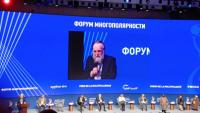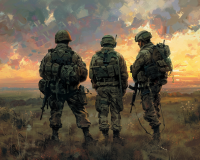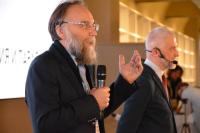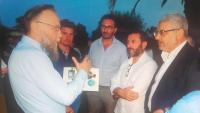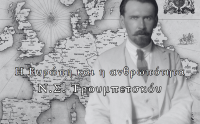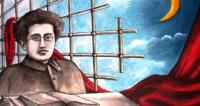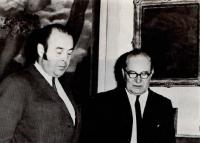Civilization
CHIẾN ĐẤU VÌ TẤT CẢ - NHỮNG ANH HÙNG CỦA CHÚNG TA SẼ ĐI VỀ ĐÂU?
Mọi người đều hiểu rằng một tầng lớp tinh hoa mới của Nga đang được rèn giũa trên mặt trận của Quân khu phía Bắc. Đây là tầng lớp dũng cảm (Hegel), sẽ phải khởi động lại trạng thái. Rõ ràng là những anh hùng của cuộc chiến ở mặt trận đã được chia thành các tầng lớp tương lai: chiến binh thuần túy, chỉ huy, nhà phát minh, nhà sáng tạo, chiến lược gia, giám đốc điều hành kinh doanh. Trong số đó còn có một tầng lớp các nhà tư tưởng mới nổi.
Triết gia Nga Dugin vừa bị ám sát hụt là ai?
Dugin có phải là người của Tổng thống Putin?
Nhà tư tưởng Dugin là người đã dự báo sẽ có thảm kịch đổ máu ở Ukraine, đồng thời được phương Tây đặt cho biệt danh kỳ lạ - “bộ não của Putin”. Vậy Dugin thực sự là ai và tư tưởng của ông như thế nào?
Có một điều thú vị là Dugin nổi tiếng ở nước ngoài hơn là ở Nga. Nhưng không phải vì tư tưởng triết học mà vì các nỗ lực tuyên truyền của phương Tây.
Báo chí tiếng Anh của Mỹ và Tây Âu đặt cho Dugin các biệt danh như “bộ não của Putin” và “Rasputin của Putin” để phản ánh cái được cho là ảnh hưởng của ông lên thế giới quan của Tổng thống Putin và giới tinh hoa lãnh đạo nước Nga. Tạp chí Foreign Policy (Chính sách Đối ngoại) đã đưa Dugin vào danh sách “Các nhà tư tưởng Toàn cầu” của ấn phẩm này năm 2014 vì coi ông là “người hoạch định chính tư tưởng mở rộng Nga”.
Học thuyết Tân Á-Âu của Aleksandr G. Dugin và hệ lụy địa chính trị của nó
Tóm tắt: Aleksandr Gelievich Dugin (Александр Гельевич Дугин), giáo sư Đại học Tổng hợp Quốc gia Moscow Lomonosov, là nhà hoạt động chính trị có tư tưởng gây ảnh hưởng rất đáng kể ở Nga khoảng 30 năm nay. “Học thuyết Tân Á Âu” của ông là sự kế thừa những ý tưởng chống phương Tây của Nga có từ thế kỷ XIX, nhưng được tô đậm thêm bằng hoài niệm về quá khứ của nước Nga thời Sa hoàng vĩ đại và một phần thời Liên bang Xô viết hùng mạnh. Luận thuyết cơ bản của Dugin là, nhân tố địa lý mới là nguyên nhân cốt lõi tạo ra sức mạnh Nga xưa và nay chứ không phải nhân tố kinh tế. Dugin kêu gọi người Nga phải có sứ mệnh phục hưng quá khứ, chống lại phương Tây và NATO, chinh phục các dân tộc xung quanh và vĩnh viễn làm chủ trung tâm lục địa Á Âu. Học thuyết Tân Á Âu của Dugin được nhiều người Nga cổ súy và đã trở thành nhân tố tinh thần đáng kể ở Nga từ năm 2008 đến nay, nhưng bị dư luận thế giới coi là nhân tố gây hệ luỵ hết sức tiêu cực cho nước Nga, châu Âu và thế giới, nhất là từ khi xung đột Nga – Ukraine nổ ra.
Η Ευρώπη και η ανθρωπότητα
Φέρνω το παρόν έργο στην προσοχή του κοινού όχι χωρίς κάποια ανησυχία. Οι ιδέες που εκφράζονται σε αυτό πήραν μορφή στο μυαλό μου πριν από δέκα και πλέον χρόνια. Από τότε τις έχω συζητήσει συχνά με διάφορους ανθρώπους, επιθυμώντας είτε να επαληθεύσω τις δικές μου απόψεις είτε να πείσω άλλους. Πολλές από αυτές τις συζητήσεις και αντιπαραθέσεις ήταν αρκετά χρήσιμες για μένα, διότι με ανάγκασαν να επανεξετάσω τις ιδέες και τα επιχειρήματά μου με μεγαλύτερη λεπτομέρεια και να τους δώσω πρόσθετο βάθος. Όμως οι βασικές μου θέσεις παρέμειναν αμετάβλητες.
COUNTER-HEGEMONY IN THE THEORY OF THE MULTIPOLAR WORLD
Although the concept of hegemony in Critical Theory is based on Antonio Gramsci’s theory, it is necessary to distinguish this concept’s position on Gramscianism and neo-Gramscianism from how it is understood in the realist and neo-realist schools of IR.
The classical realists use the term “hegemony” in a relative sense and understand it as the “actual and substantial superiority of the potential power of any state over the potential of another one, often neighboring countries.” Hegemony might be understood as a regional phenomenon, as the determination of whether one or another political entity is considered a “hegemon” depends on scale. Thucydides introduced the term itself when he spoke of Athens and Sparta as the hegemons of the Peloponnesian War, and classical realism employs this term in the same way to this day. Such an understanding of hegemony can be described as “strategic” or “relative.”
In neo-realism, “hegemony” is understood in a global (structural) context. The main difference from classical realism lies in that “hegemony” cannot be regarded as a regional phenomenon. It is always a global one. The neorealism of K. Waltz, for example, insists that the balance of two hegemons (in a bipolar world) is the optimal structure of power balance on a world scale[ii]. R. Gilpin believes that hegemony can be combined only with unipolarity, i.e., it is possible for only a single hegemon to exist, this function today being played by the USA.
In both cases, the realists comprehend hegemony as a means of potential correlation between the potentials of different state powers.
Gramsci's understanding of hegemony is completely different and finds itself in a completely opposite theoretical field. To avoid the misuse of this term in IR, and especially in the TMW, it is necessary to pay attention to Gramsci’s political theory, the context of which is regarded as a major priority in Critical Theory and TMW. Moreover, such an analysis will allows us to more clearly see the conceptual gap between Critical Theory and TMW.
Inleiding tot de idee Marc. Eemans
Toen ik aanvaardde een essay te wijden aan het werk en het denken van de schilder, dichter en kunsthistoricus Marc. Eemans, heb ik me afgevraagd of het in mijn geval geoorloofd was te spreken van een zekere continuïteit in zijn geestelijke ontwikkeling. Langzaam maar zeker kwamen elementen en argumenten aan het licht om mijn overtuiging te staven dat die vraag positief macht beantwoord worden. Aldus is deze geschiedenis van de intellectuele en creatieve levensweg van Marc. Eemans ontstaan. Daarbij werd de klemtoon vooral op zijn denken en op zijn poëtisch oeuvre gelegd, vermits het illustratiemateriaal dat deze uitgave verrijkt, als een soort picturaal complement van mijn stelling kan beschouwd worden. Overigens bleven om voor de hand liggende redenen, biografische en andere gegevens buiten beschouwing.
Hopelijk vergeeft de lezer het me dat ik met hem wegen ga verkennen, die men normaliter in essays van het onderhavige genre links laat liggen. Maar op de eerste plaats is het zo dat ik geen kunsthistoricus ben en het derhalve als een punt van elementaire intellectuele eerlijkheid beschouw me onbevoegd te verklaren om een verantwoord waardeoordeel over het schilderkunstig werk van Marc. Eemans uit te spreken. En voorts is er het oude adagium « de gustibus et coloribus non disputandum », dat in de loop der tijden zijn geldigheid heeft behouden. Waarom de lezer dan ook willen beïnvloeden met een onvermijdelijk subjectieve analyse van de boodschap die de schilderijen van Marc. Eemans brengen?

